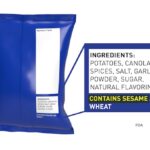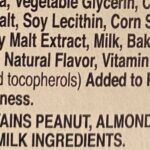The FDA has closed another mystery Salmonella outbreak with no resolution. The Salmonella outbreak that sickened at least 274 people has ended, and the investigation has been closed; no food source was identified. This is the 14th outbreak in the last year that has been unsolved by the FDA. It's unusual that with so many people sick, a food source could not be found. The pathogen responsible for those illnesses was Salmonella Typhimurium. The FDA did initiate traceback, and conducted sample collection and analysis, but couldn't solve this mystery Salmonella outbreak. That means there are only two active outbreaks going on in the United States right now that are linked to FDA-regulated foods. Both outbreaks are active, and the investigations are ongoing. Those outbreaks are the … [Read more...]
It’s Official: Sesame is a Food Allergen, Per the FDA
Sesame is a food allergen, according to the FDA. As of January 1, 2023, sesame allergen labeling is required on all food packages. But there is a lag time. Sesame joins the eight other major food allergens: eggs, milk, soy, finfish, shellfish, peanuts, tree nuts, and wheat. These ingredients must, by federal law, be listed on ingredient labels and any food that includes them must also have an allergen statement. The transition period, however, means that people who are allergic to sesame must still be careful. Food products that are already in the store, in stock, or in transport to stores do not need to have the label yet. And since some foods have a long shelf life, it could be months before all foods that contain sesame actually have an allergen statement. It's also … [Read more...]
Is the Honey You Buy Really Pure Honey?
The FDA has released data on economic adulteration in honey, from an assignment that was carried out in 2021 and 2022. The agency tested imported honey for what is called economically motivated adulteration, or EMA. Someone can leave out, take out, or substitute a valuable ingredient or part of a food, or can add a substance to a food to make it appear better. So is the honey you buy really pure honey? Products labeled as honey can contain less expensive sweeteners, such as corn syrup and cane syrup. The FDA tested 144 samples of imported honey from bulk and retail shipments that came from 32 countries, and found that 14 samples, or 10%, were not pure honey. Those shipments were refused entry into the United States and those companies were placed on an import alert. When … [Read more...]
Get Holiday Food Safety Tips From the FDA
It's the holiday season, which means that people are cooking more and hosting parties and gatherings. But this may be the first time cooking for a large group for you. In that case, these holiday food safety tips from the FDA will help. If you don't understand food safety, the risk that someone will get sick from how you handle food increases. The possibility of cross-contamination, undercooked, and improper chilling and reheating exists every time you are in the kitchen. Learning these rules is especially important if you have anyone at your gathering who is at higher risk for serious complications from food poisoning, including the elderly, young children, pregnant women, and those with chronic illnesses and compromised immune systems. It's important to know the four basic food … [Read more...]
FDA Issues Guidance on Requirements For Food Allergen Labeling
The FDA has issued new guidance for food allergen labeling. This new document will answer questions about label requirements, and update information that was in earlier editions of this final document. The FDA is seeking comments on this new guidance. There are nine major food allergens, according to the government. If one of these ingredients is present in the food, it must be listed in the ingredient list on the label, and in a special allergen statement that is put on every package. Those nine allergens are milk, soy, wheat, eggs, finfish, shellfish, tree nuts, peanuts, and sesame seeds. Sesame was added when the FASTER Act was passed in April 2021. Those allergens were chosen based on how common the reactions to them are, and their severity. The draft guidance includes new … [Read more...]
FDA Issues Final Rule on Food Traceability Under FSMA
The FDA has issued the final rule on food traceability under the Food Safety and Modernization Act of 2011 (FSMA). Traceability is the ability to identify foods that may be contaminated, especially if that food is suspected as being part of an outbreak. The rule establishes traceability record keeping requirements for anyone who manufacturers, processes, packs, or holds foods that are on the Food Traceability List. Companies and people subject to this rule must maintain records containing Key Data Elements associated with specific Critical Tracking Events. They must provide information to the FDA within 24 hours or some other time frame to which the FDA has agreed. Foods that are on the Food Traceability List include: cheeses other than hard cheeses, specifically soft and … [Read more...]












